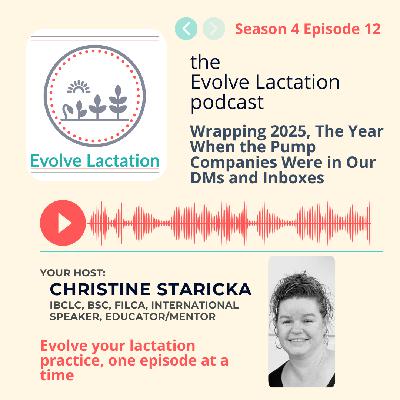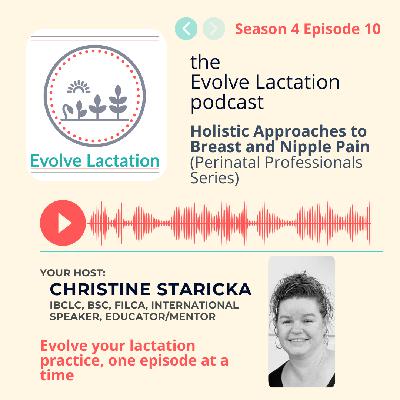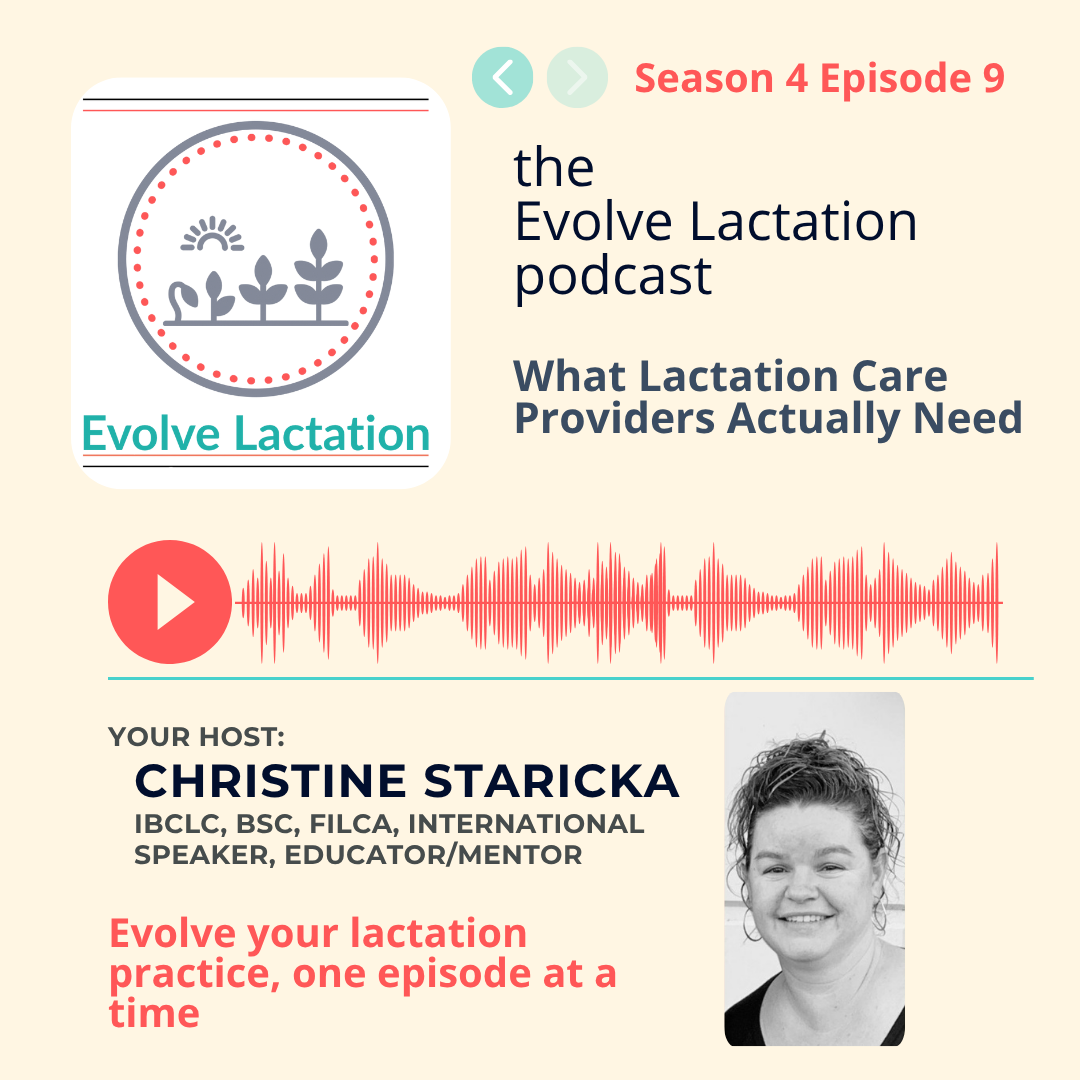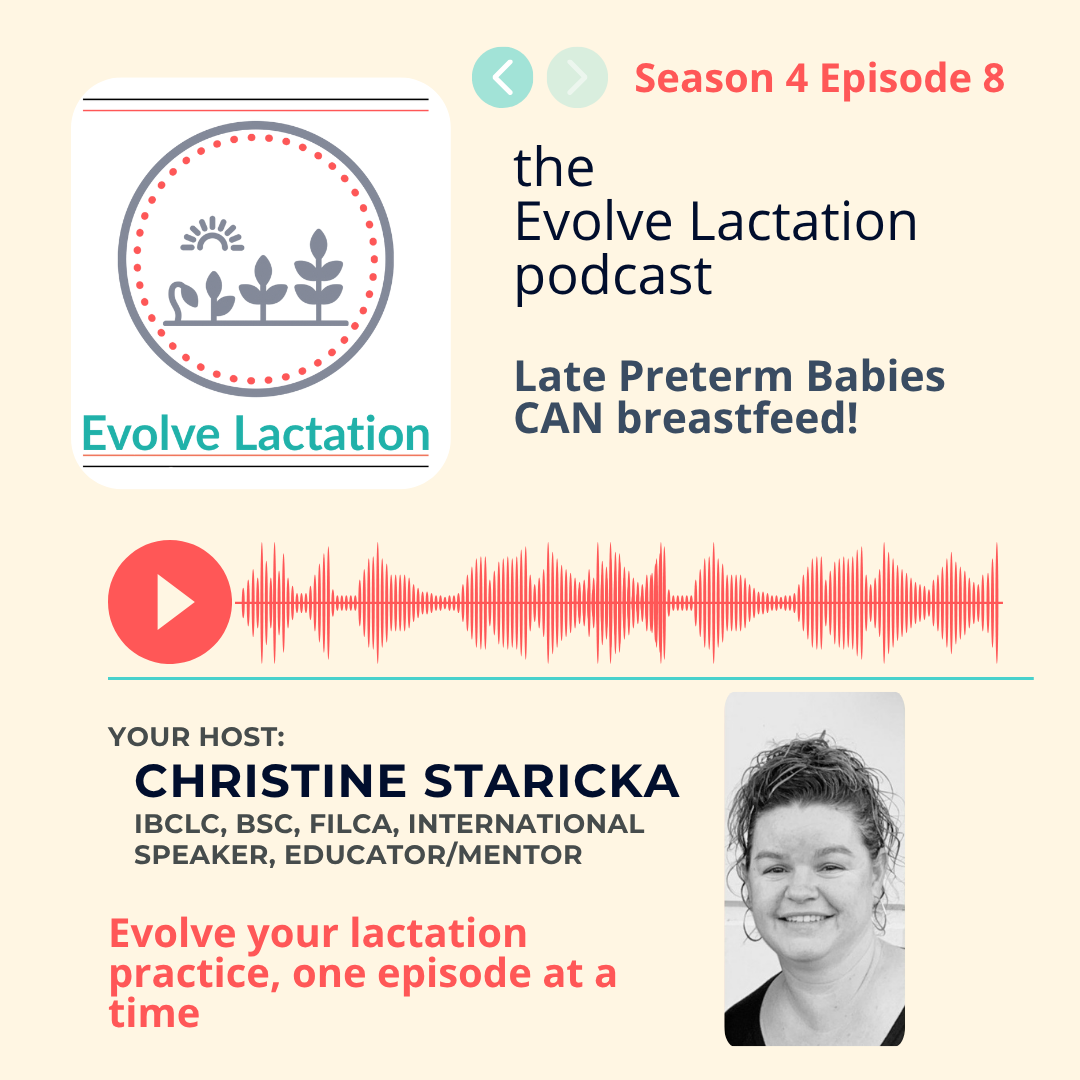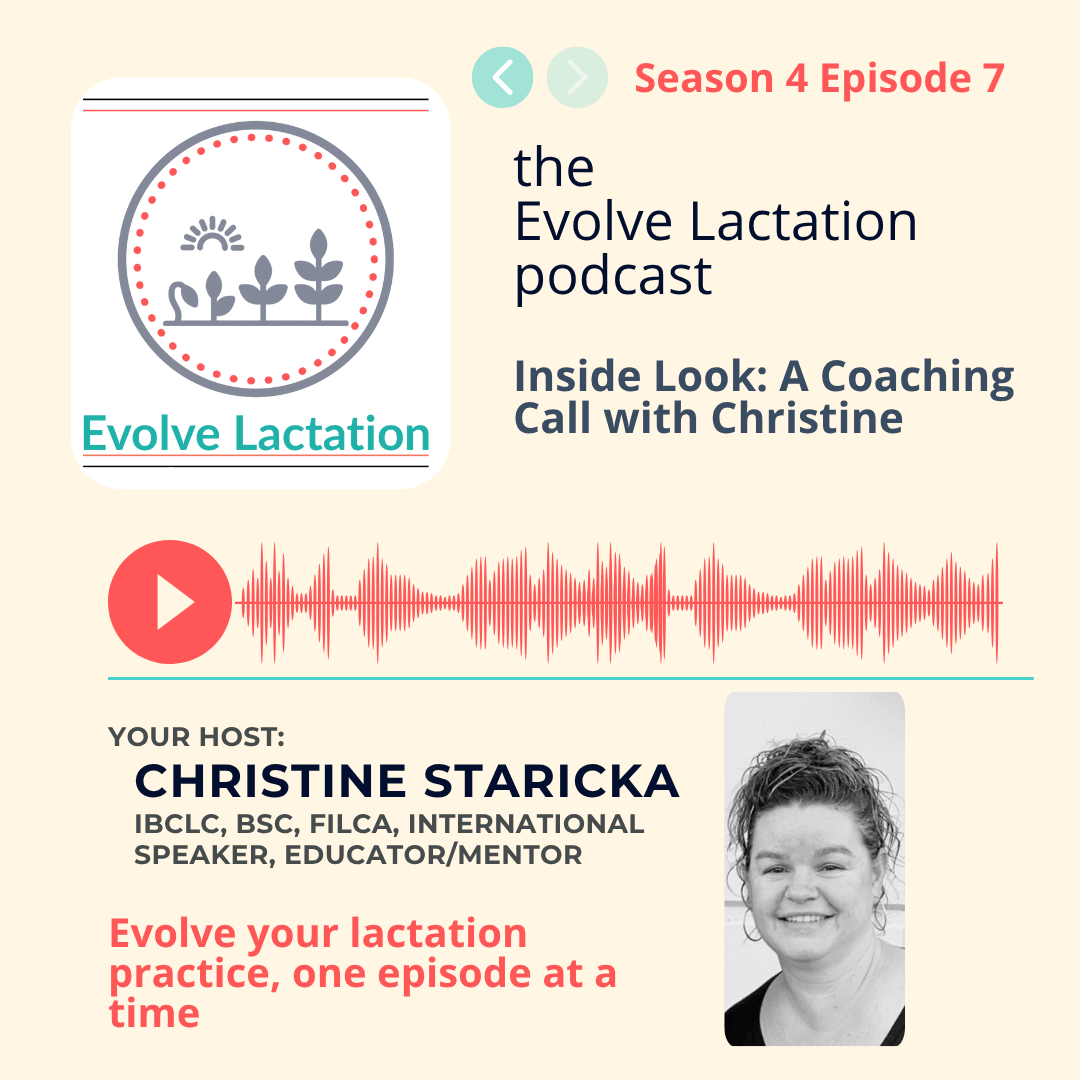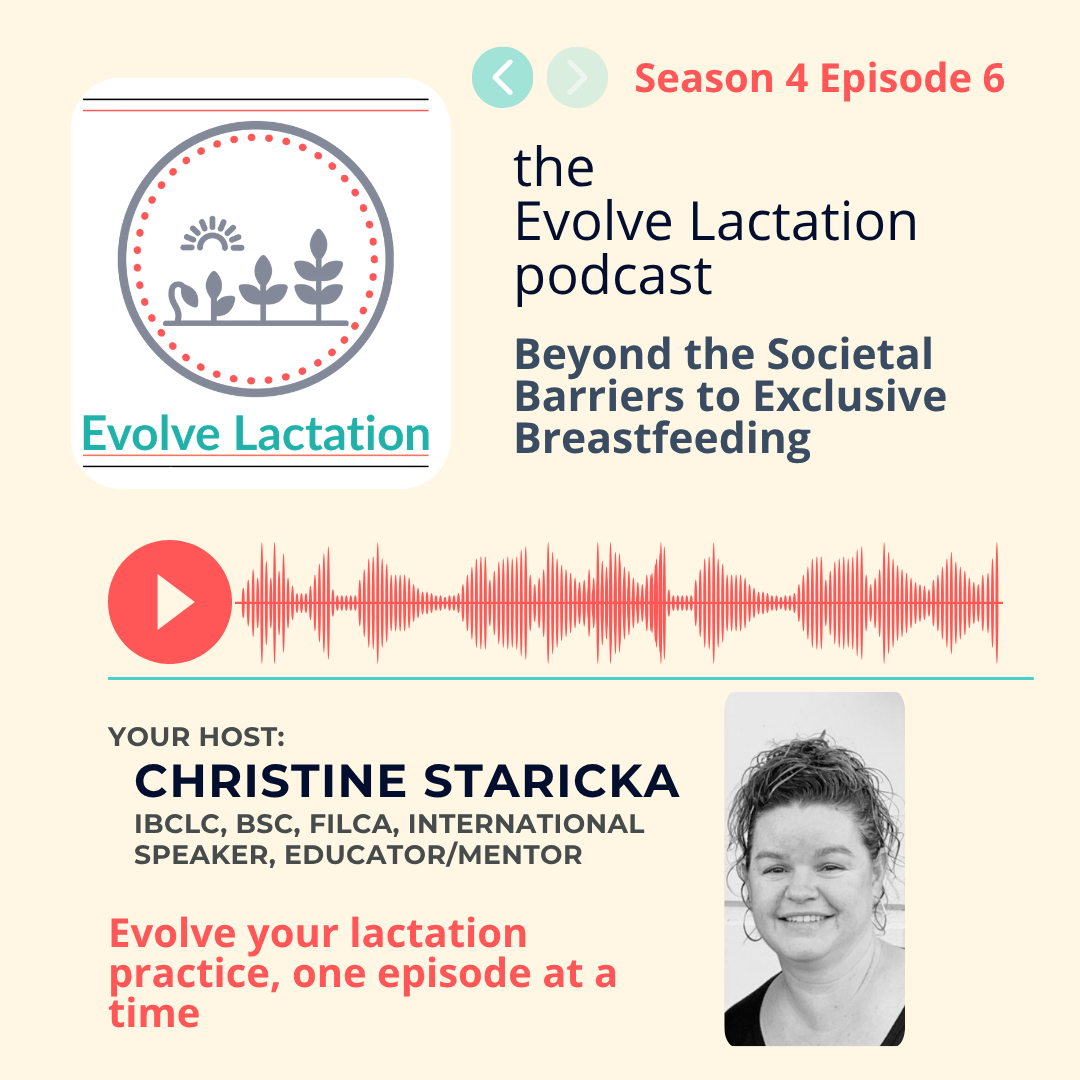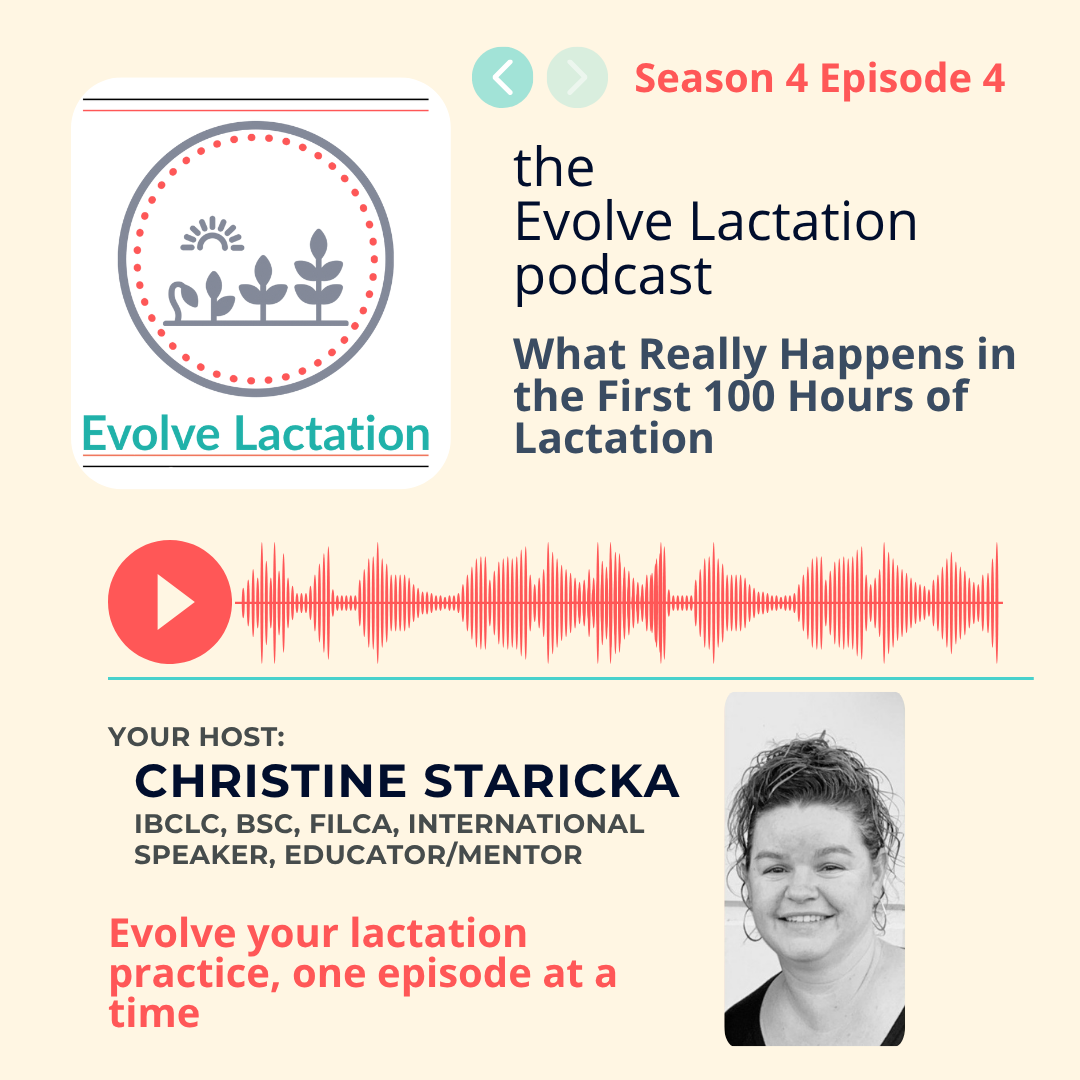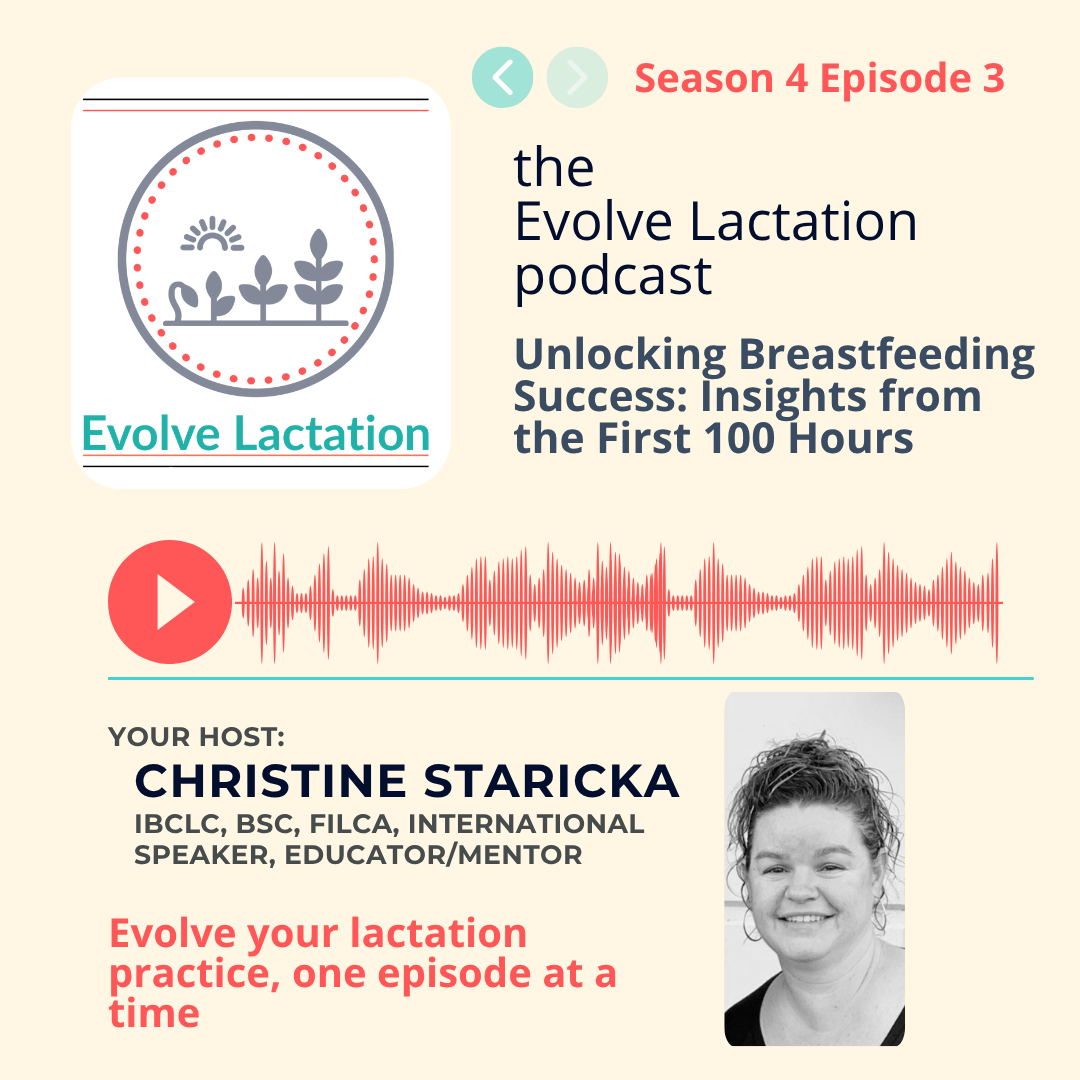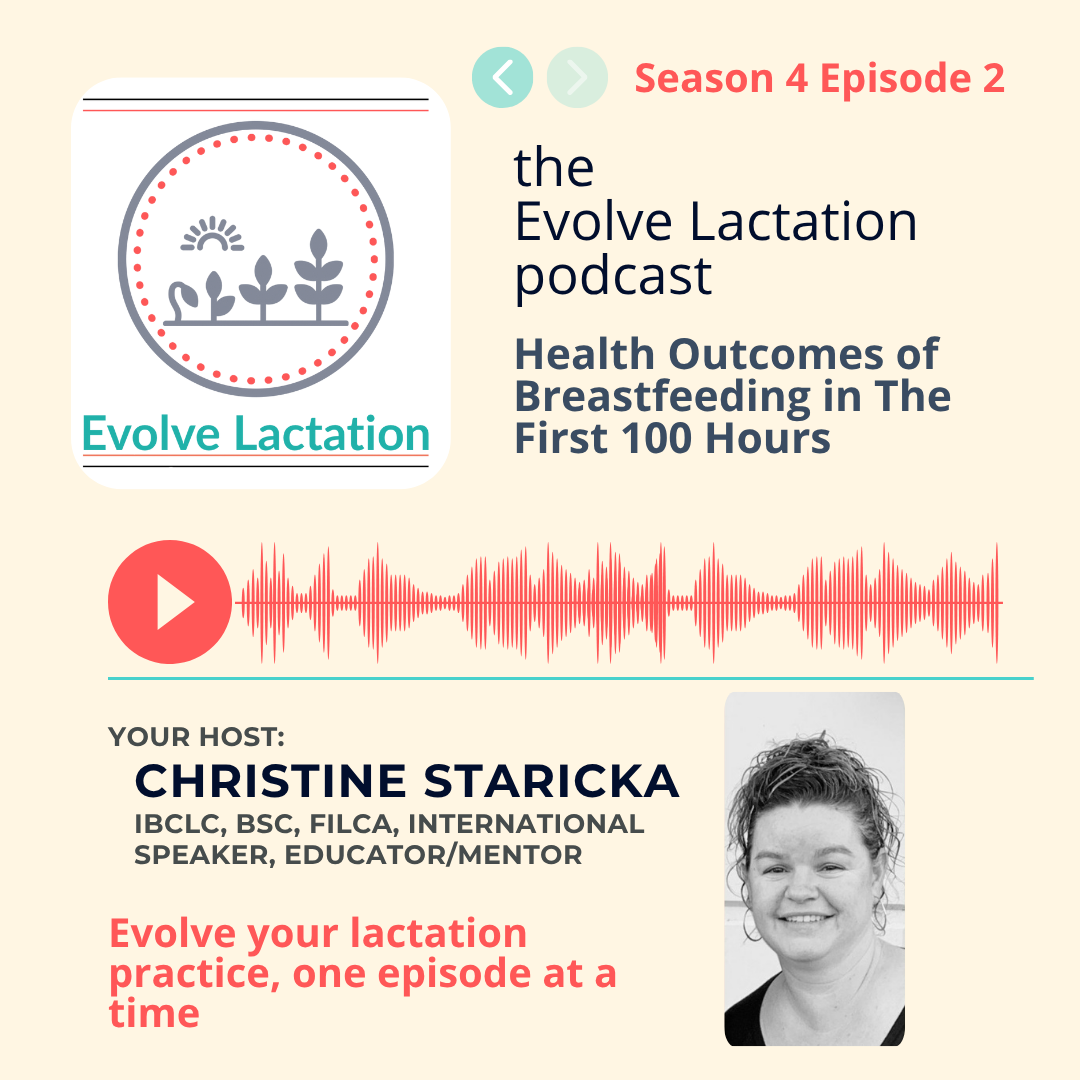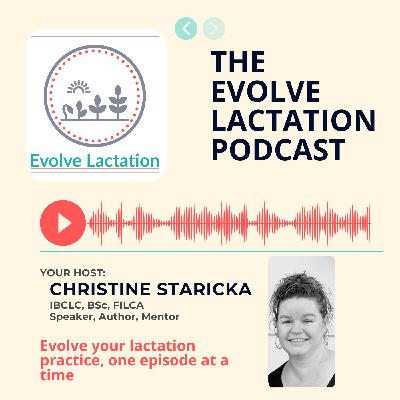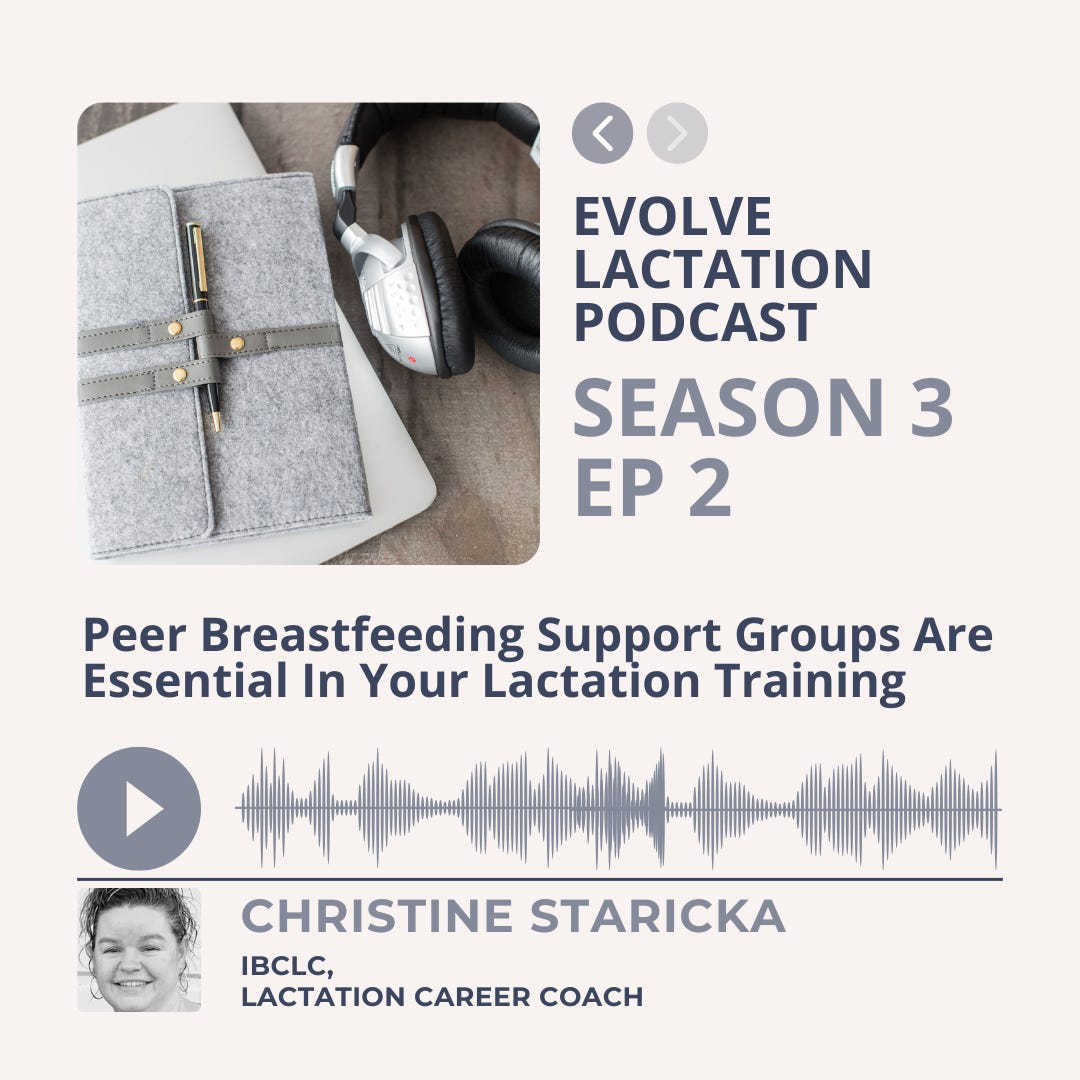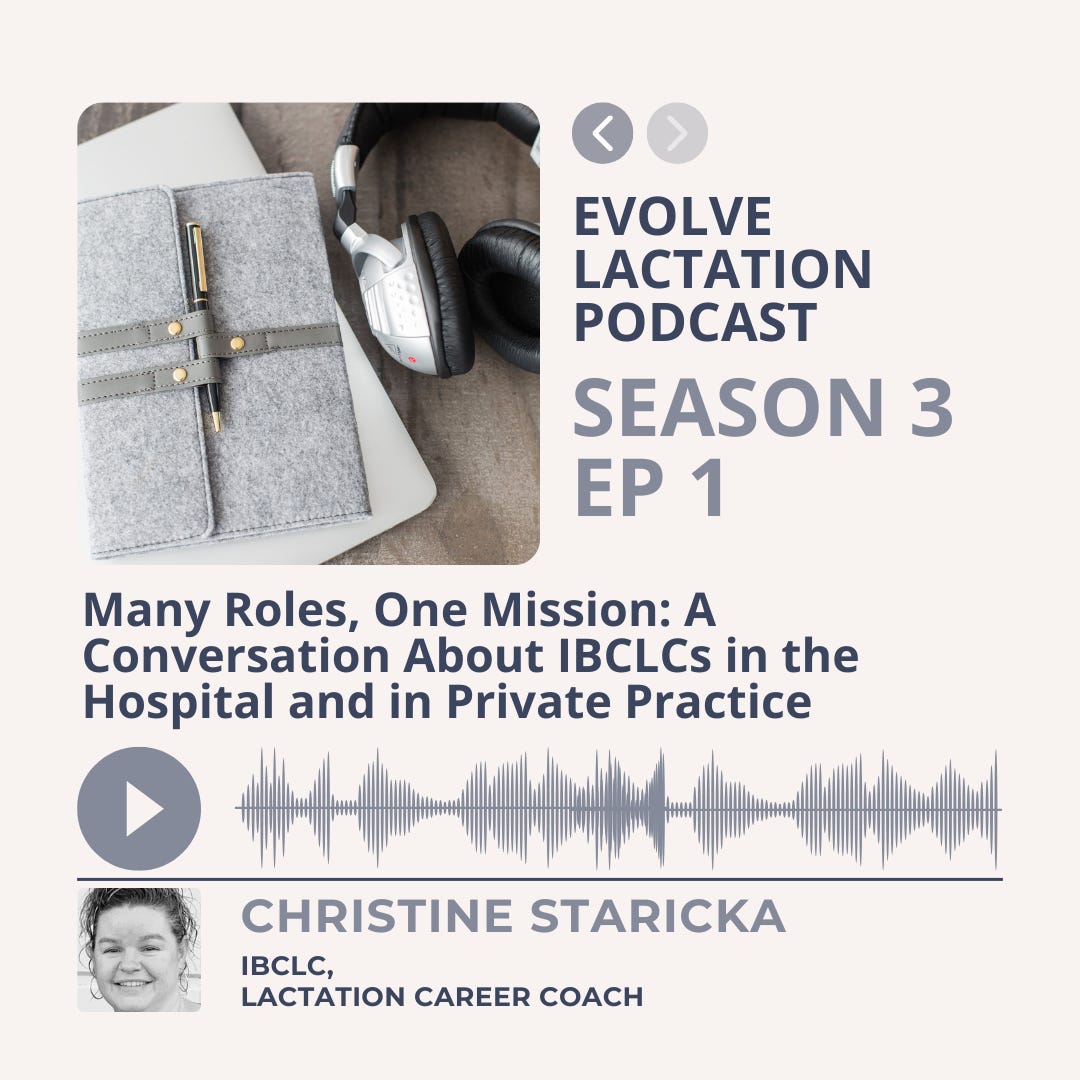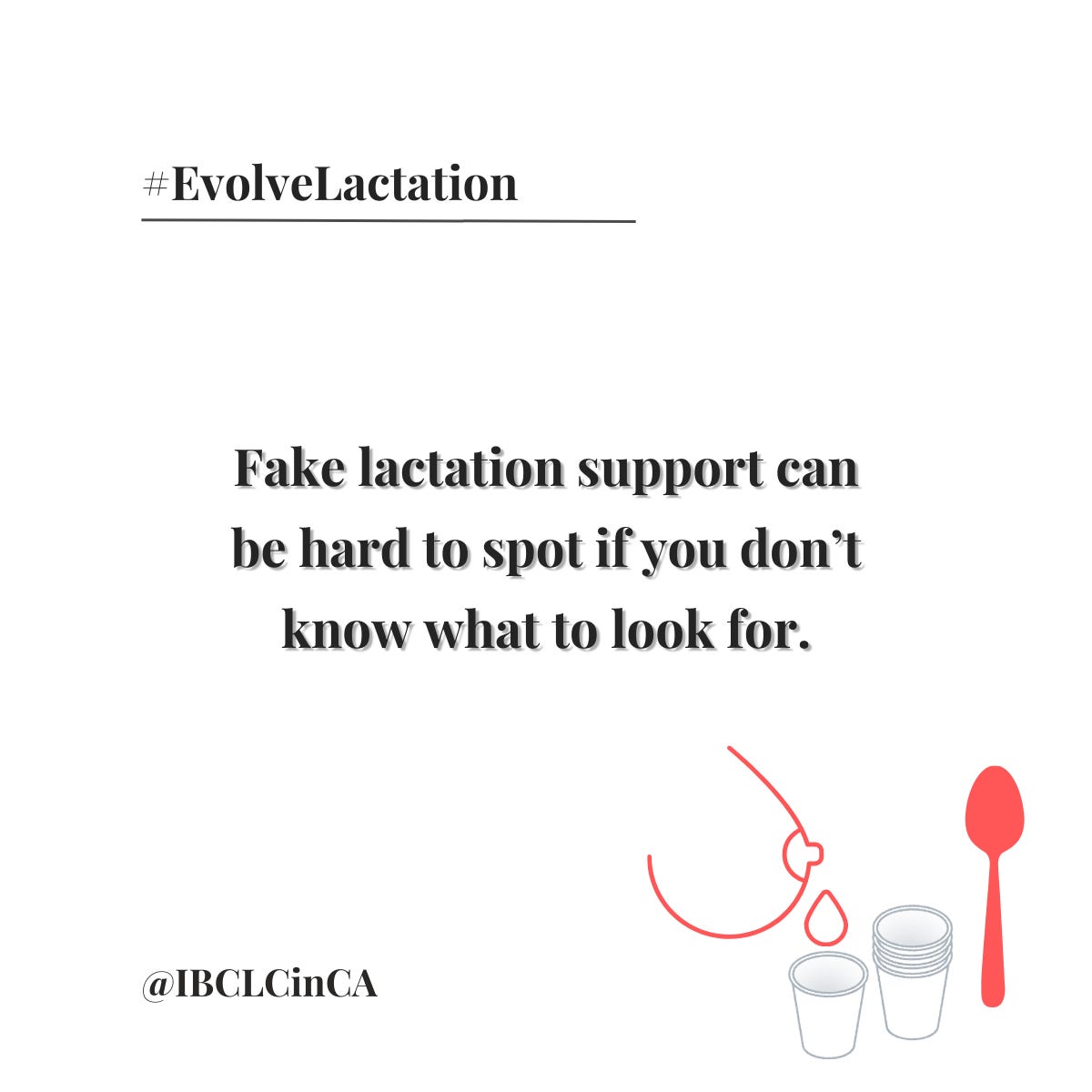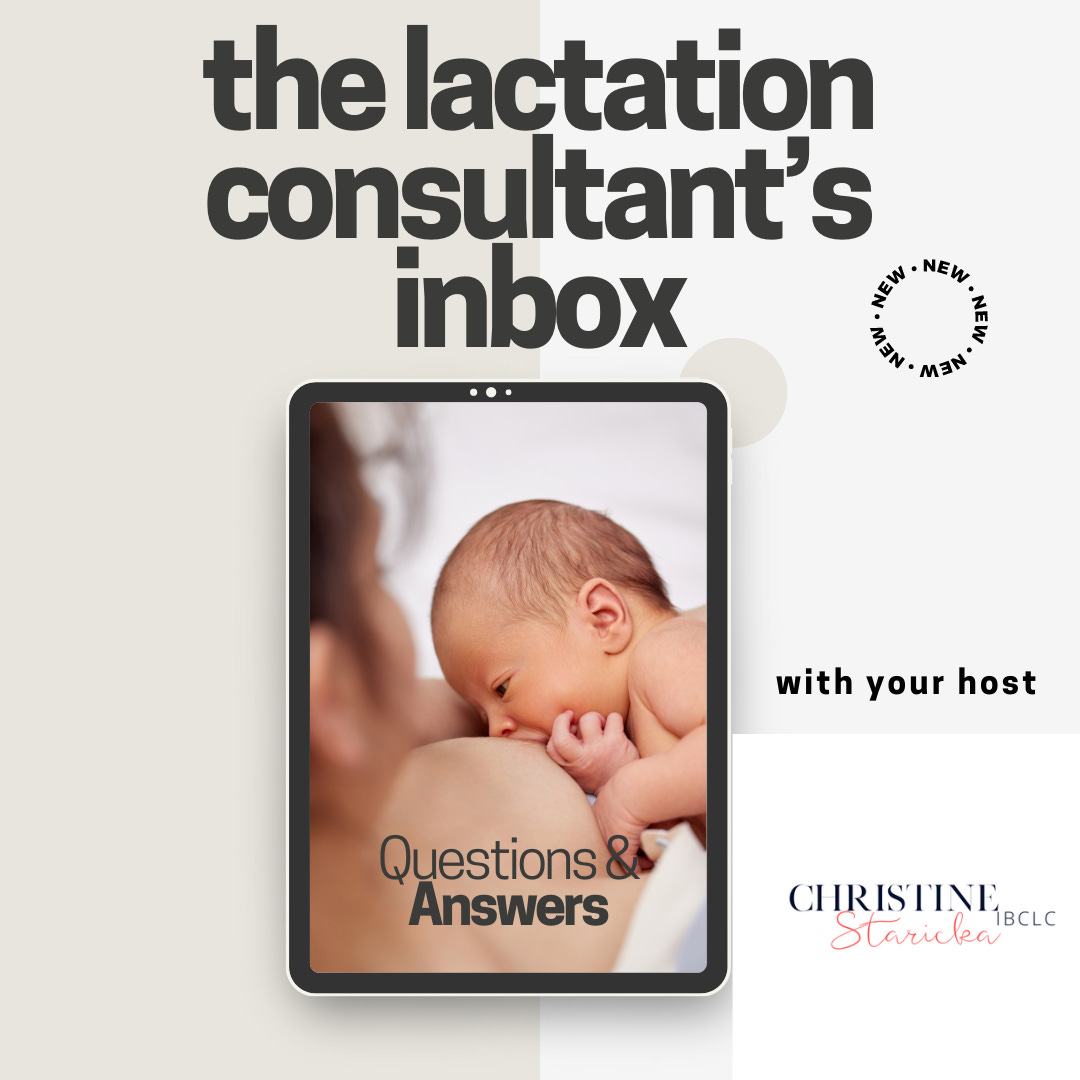Discover The Evolve Lactation Podcast
The Evolve Lactation Podcast

The Evolve Lactation Podcast
Author: Christine Staricka, IBCLC
Subscribed: 25Played: 507Subscribe
Share
© Christine Staricka, IBCLC
Description
Evolve Lactation Podcast was created to inspire, inform, and engage current and aspiring lactation care providers.
So glad you’re here! I’m Christine, an IBCLC and trained childbirth educator based in the US. I created Evolve Lactation after years of practicing clinical lactation care and providing professional lactation training to other health care providers to serve as a resource for learning and connecting over all things lactation-related.
Whether you’re seasoned or studying, I hope this show will make you think and inspire you to act.
ibclcinca.substack.com
So glad you’re here! I’m Christine, an IBCLC and trained childbirth educator based in the US. I created Evolve Lactation after years of practicing clinical lactation care and providing professional lactation training to other health care providers to serve as a resource for learning and connecting over all things lactation-related.
Whether you’re seasoned or studying, I hope this show will make you think and inspire you to act.
ibclcinca.substack.com
59 Episodes
Reverse
In this 2025 wrap-up episode of the Evolve Lactation Podcast, hosts Christine Staricka and Olena Dobczansky reflect on the significant events and themes of 2025, emphasizing personal growth, the importance of foundational knowledge in lactation, and the ethical responsibilities of lactation consultants. We discuss the impact of commercialism on breastfeeding narratives, the need to influence other clinicians, and the power of personal experiences in shaping the conversation around lactation. As we prepare for 2026, we encourage you to let go of outdated practices and embrace new opportunities for growth and community support.Evolve Lactation Pros is building a space where practitioners can admit uncertainty, examine their assumptions, make mistakes, and grow - together.You’re invited. You belong here.What we build together is going to change the field.What you will gain and how you will grow is going to change your practice and your career trajectory.You are so welcome to join us at https://ibclcinca.substack.com/.Follow, Rate, and Review the Evolve Lactation Podcast right here!Thanks for listening and sharing!You can get the book Evolving the Modern Breastfeeding Experience: Holistic Lactation Care in the First 100 Hours now at this link! This is a public episode. If you'd like to discuss this with other subscribers or get access to bonus episodes, visit ibclcinca.substack.com/subscribe
In this episode, I discuss the importance of building trust through active listening in lactation consulting, the role of personal experiences in professional practice, and the need to identify and address hidden biases that can affect clinical decisions. I also talk about my upcoming workshop aimed at helping lactation professionals examine their beliefs and improve their practice.TakeawaysBuilding a relationship with clients requires active listening.Sharing personal stories can sometimes detract from client focus.Trust is built through understanding and listening, not just sharing experiences.Practitioners should not feel obligated to share their personal stories.Personal experiences can create blind spots in professional practice.Identifying hidden biases is crucial for effective lactation support.The hardest work in lactation is self-examination of biases.Training often lacks focus on personal beliefs affecting practice.Workshops can help practitioners uncover their hidden biases.Real confidence comes from self-awareness and understanding biases. Evolve Lactation Pros is building a space where practitioners can admit uncertainty, examine their assumptions, make mistakes, and grow - together.You’re invited. You belong here.What we build together is going to change the field.What you will gain and how you will grow is going to change your practice and your career trajectory.You are so welcome to join us at https://ibclcinca.substack.com/.Follow, Rate, and Review the Evolve Lactation Podcast right here!Thanks for listening and sharing!You can get the book Evolving the Modern Breastfeeding Experience: Holistic Lactation Care in the First 100 Hours now at this link! This is a public episode. If you'd like to discuss this with other subscribers or get access to bonus episodes, visit ibclcinca.substack.com/subscribe
This conversation delves into the critical role of pain in lactation, emphasizing how it affects hormonal balance and milk production. Christine Staricka, IBCLC explains that pain is not just a symptom but a significant factor that can disrupt the breastfeeding process, impacting both the mother and the baby.TakeawaysPain isn't neutral.Pain indicates that there's a problem.In lactation, pain can disrupt the release of oxytocin.Pain disrupts the hormonal milieu during breastfeeding.Pain disrupts the milk ejection reflex.The baby gets less milk if there's pain.Using a breast pump can yield less milk if there's pain.Understanding pain is key to lactation support.Oxytocin is crucial for breastfeeding success.Addressing pain can improve breastfeeding outcomes.Evolve Lactation Pros is building a space where practitioners can admit uncertainty, examine their assumptions, make mistakes, and grow - together.You’re invited. You belong here.What we build together is going to change the field.What you will gain and how you will grow is going to change your practice and your career trajectory.You are so welcome to join us at https://ibclcinca.substack.com/.Follow, Rate, and Review the Evolve Lactation Podcast right here!Thanks for listening and sharing!You can get the book Evolving the Modern Breastfeeding Experience: Holistic Lactation Care in the First 100 Hours now at this link! This is a public episode. If you'd like to discuss this with other subscribers or get access to bonus episodes, visit ibclcinca.substack.com/subscribe
In this episode, I share what I’ve been building for 2026 - Evolve Lactation Pros, a membership that address what lactation professionals actually need beyond clinical skills and business tactics. We talk about the gap in our training around processing our own experiences, the three pillars of advancing professionalism (sustainable ethics, physiologically-grounded practice, and public health integration), and why examining our own biases is essential work that no one else is providing. Plus, I introduce the first workshop coming to members: Lactation Practice Without Fear - helping you identify the hidden assumptions that can shape your clinical decisions.For too long, lactation consultants have practiced in isolation, navigating ethical dilemmas without guidance, watching tool-dependent approaches dilute the field’s integrity, and struggling to sustain practices that honor both their values and their need to make a living.Professional organizations lack the resources to provide real community or practical support. The field is fragmenting across generational divides about ethics. Commercial pressures are pushing IBCLCs toward conflicts of interest. Social media rewards clickbait over evidence. And few are talking about how to navigate AI, develop IBCLC-specific clinical protocols, or position lactation support as the essential public health work it truly is.This cannot continue.The mission is clear:Advancing professionalism in the lactation field through sustainable ethics, physiologically-grounded practice, and public health integration so that integrity-driven practitioners thrive and families receive the breastfeeding care they deserve.The field needs a new infrastructure.We’ve already got professional organizations with membership dues and big conferences.We have training programs that teach tools and billing codes, clinical mentorships for before and after IBCLC certification, and plenty of options for continuing education.What do we need? A movement of integrity-driven practitioners who refuse to let the field lose its way.Evolve Lactation Pros is building that infrastructure and that movement.We provide what practitioners desperately need but cannot find anywhere else:Sustainable Ethics - frameworks for practicing with integrity while building financially viable careers, navigating WHO Code and professional standards in real-world scenarios, and resisting commercial pressures without martyrdom.Physiologically-Grounded Practice - clinical decision-making rooted in understanding how breastfeeding actually works, moving beyond tool-dependency to evidence-informed practice, and developing the “critical faith in breastfeeding on its own merits” that creates true expertise.Public Health Integration - positioning lactation support within broader public health frameworks, advocating for professional recognition and resources, and connecting individual practice to population-level impact.Evolve Lactation Pros is creating the community that doesn’t exist.We are building the resources the field lacks.Frameworks for ethical decision-making. Protocols developed by and for IBCLCs. Guidance on emerging challenges like AI. Marketing strategies that work without compromising integrity. Clinical reasoning tools based on physiology, not products. Advocacy training that gives practitioners voice in policy conversations.We are elevating the entire profession.Because when individual practitioners practice with integrity, the whole field benefits.Because when enough of us understand physiology deeply, we shift what’s considered normal practice.Because when we position ourselves as public health professionals, we change how the healthcare system sees and values our work.Because families thrive when they’re cared for by resilient, skilled, ethical lactation consultants who are supported in their own growth.This is not about judgment. This is about standards.We’re not dividing the field into “good” and “bad” practitioners. We’re inviting committed practitioners to do the ongoing work of professional growth. We’re acknowledging that none of us is perfect, all of us have biases, and excellence requires continuous reflection and learning.Evolve Lactation Pros is building a space where practitioners can admit uncertainty, examine their assumptions, make mistakes, and grow - together.You’re invited. You belong here. What we build together is going to change the field. What you will gain and how you will grow is going to change your practice and your career trajectory. You are so welcome to join us at https://ibclcinca.substack.com/.Follow, Rate, and Review the Evolve Lactation Podcast right here!00:00 Introduction to Office Hours and Reflection02:45 Navigating Changes in Lactation Care06:06 Resilience in Private Practice08:56 The Importance of Professional Organizations11:43 Diverse Credentials and Education in Lactation15:07 The Historical Perspective on Breastfeeding17:57 Zooming In and Out: Balancing Individual and Global Perspectives20:51 Ethical Considerations in Lactation Practice23:43 Creating a Framework for Ethical Decision Making28:28 Impact of Clinical Lactation on Families29:26 Integrating Advocacy into Lactation Practice30:45 The Role of Public Health in Lactation32:37 Creating a Supportive Community for Lactation Educators34:01 Workshop Insights: Personal Growth in Lactation Care36:37 Processing Personal Experiences in Lactation39:07 Identifying Biases in Lactation Practice41:59 The Importance of Continuous Learning44:25 Navigating Evidence-Based Practice in Lactation51:58 Public Health Integration and Lactation AdvocacyThanks for listening and sharing!You can get the book Evolving the Modern Breastfeeding Experience: Holistic Lactation Care in the First 100 Hours now at this link! This is a public episode. If you'd like to discuss this with other subscribers or get access to bonus episodes, visit ibclcinca.substack.com/subscribe
In the latest episode of my Perinatal Professionals series, I explore the unique challenges faced by late preterm newborns, particularly in relation to breastfeeding and parental support. I review the characteristics of late preterm infants, the importance of understanding their developmental needs, and the critical role of professional support in improving breastfeeding outcomes. This episode emphasizes the need for parents to be informed about their baby's vulnerabilities and the implications for feeding and care.You can learn more and enroll in the First 100 Hours Masterclass right here.Takeaways:Late preterm infants are born between 34 and 36 weeks gestation.They face increased risks for various health issues compared to term infants.Understanding the unique needs of late preterm babies is crucial for effective care.Breastfeeding challenges are often linked to the neurological and muscular immaturity of late preterm infants.Professional support significantly improves breastfeeding rates for these infants.Parents need to be educated about the vulnerabilities of late preterm babies.Exclusive human milk feeding can reduce hospitalization risks.Breastfeeding self-efficacy is important for mothers of late preterm infants.Parental guidance should be tailored to the specific needs of late preterm babies.Awareness of developmental differences can help parents make informed feeding decisions.Follow, Rate, and Review the Evolve Lactation Podcast right here!00:00 Understanding Late Preterm Newborns02:45 Challenges in Breastfeeding Late Preterm Infants06:04 The Importance of Parental Education08:56 Professional Support and Breastfeeding Success11:39 Optimizing Feeding for Late Preterm BabiesEvolve Lactation with Christine Staricka is a reader-supported publication. To receive new posts and support my work, consider becoming a free or paid subscriber.Thanks for listening!You can get the book Evolving the Modern Breastfeeding Experience: Holistic Lactation Care in the First 100 Hours now at this link! This is a public episode. If you'd like to discuss this with other subscribers or get access to bonus episodes, visit ibclcinca.substack.com/subscribe
In this coaching call, Evolve Lactation Community member Kristen Navia and I discuss the cyclical nature of doula and lactation work, strategies for utilizing downtime for business growth, and the importance of community support. Kristen shares her insights on preparing for the IBCLC exam, the emotional rewards of supporting families, and the unique challenges faced in lactation consulting. Our conversation emphasizes the integration of doula and lactation roles and the significance of feedback, relationships, and community in building a successful practice.You can learn more and enroll in the First 100 Hours Masterclass right here.Takeaways:The doula and lactation business is cyclical, with busy and slow periods.Utilizing downtime effectively can lead to business growth.Community support is crucial for emotional well-being and professional development.The Lactation College provides valuable resources for exam preparation.Short, bite-sized learning materials can enhance retention and understanding.Feedback from clients and peers is essential for growth and improvement.Building relationships with clients can lead to referrals and repeat business.Managing expectations is key in client interactions.Integrating doula and lactation roles can provide a holistic approach to care.The emotional rewards of supporting families are profound and fulfilling.Follow, Rate, and Review the Evolve Lactation Podcast right here!04:02 Navigating Business Cycles in Doula and Lactation Services07:02 Utilizing Downtime for Business Growth09:54 The Impact of Lactation College on Exam Preparation13:01 Modern Learning Methods in Lactation Education15:53 Resources and Strategies for Effective Study21:23 Understanding Lactation from a Medical Perspective24:08 The Evolution of Lactation Knowledge27:32 Integrating New Research into Practice31:21 Navigating Consultations with Families36:56 The Importance of Community and Feedback41:00 Building a Referral Network in Lactation SupportEvolve Lactation with Christine Staricka is a reader-supported publication. To receive new posts and support my work, consider becoming a free or paid subscriber.Thanks for listening!You can get the book Evolving the Modern Breastfeeding Experience: Holistic Lactation Care in the First 100 Hours now at this link! This is a public episode. If you'd like to discuss this with other subscribers or get access to bonus episodes, visit ibclcinca.substack.com/subscribe
Welcome to the Perinatal Professionals Series as presented on the Evolve Lactation Podcast! This series provides access to strategic, evidence-based lactation education for perinatal professionals who are ready to level up their breastfeeding support skills and knowledge.Follow, Rate, and Review the Evolve Lactation Podcast right here!Evolve Lactation with Christine Staricka is a reader-supported publication. To receive new posts and support my work, consider becoming a free or paid subscriber.In this episode of the Evolve Lactation podcast, I talk about the various barriers to breastfeeding, differentiating between societal, physiological, and clinical challenges. I emphasize the impact of misinformation, the lack of fundamental lactation support, and the use of tools that can mask breastfeeding problems. I also highlight the importance of education and professional development in addressing these barriers, advocating for a more informed and supportive environment for breastfeeding mothers.You can learn more and enroll in the First 100 Hours Masterclass right here. Takeaways:00:00 Understanding Barriers to Breastfeeding02:47 Misinformation in Lactation Support05:51 Lack of Fundamental Lactation Support08:40 Tools That Mask Breastfeeding Problems11:03 Clinical Barriers in Healthcare Settings14:13 The Role of Education in Lactation Support16:59 Addressing Psychological Barriers20:10 The Importance of Accurate Information22:56 Navigating Pediatric Care25:40 The Need for Professional Development28:25 Conclusion and Call to ActionThanks for listening!You can get the book Evolving the Modern Breastfeeding Experience: Holistic Lactation Care in the First 100 Hours now at this link! This is a public episode. If you'd like to discuss this with other subscribers or get access to bonus episodes, visit ibclcinca.substack.com/subscribe
Welcome to the Perinatal Professionals Series as presented on the Evolve Lactation Podcast! This series provides access to strategic, evidence-based lactation education for perinatal professionals who are ready to level up their breastfeeding support skills and knowledge.Follow, Rate, and Review the Evolve Lactation Podcast right here!Evolve Lactation with Christine Staricka is a reader-supported publication. To receive new posts and support my work, consider becoming a free or paid subscriber.SummaryIn this episode, I share insights about the essential practices that empower new parents to provide their own milk during the crucial first 100 hours. Rediscover the importance of early and frequent breastfeeding, the role of skin-to-skin contact, and how to navigate the challenges of newborn feeding through the lens of breastfeeding support in the First 100 Hours. Whether you’re a new parent or a healthcare professional, this episode offers valuable insights into optimizing milk production and supporting exclusive breastfeeding.TakeawaysParents should be educated prenatally about breastfeeding.Newborns need to breastfeed frequently and early.Skin-to-skin contact is crucial for newborns.Understanding diaper output is important for gauging feeding success.Parents should feel in control of their feeding choices.Milk production begins during pregnancy and increases after birth.Frequent feeding supports long-term milk production.Breastfeeding should be pain-free for mothers.Parents need to understand the rhythm of early breastfeeding.Chapters00:00 Empowering New Parents: The First 100 Hours11:07 Understanding Milk Production and Feeding Rhythms21:17 Optimizing Breastfeeding Techniques and SupportThanks for listening!You can get the book Evolving the Modern Breastfeeding Experience: Holistic Lactation Care in the First 100 Hours now at this link! This is a public episode. If you'd like to discuss this with other subscribers or get access to bonus episodes, visit ibclcinca.substack.com/subscribe
Welcome to the Perinatal Professionals Series as presented on the Evolve Lactation Podcast! This series provides access to strategic, evidence-based lactation education for perinatal professionals who are ready to level up their breastfeeding support skills and knowledge.Follow, Rate, and Review the Evolve Lactation Podcast right here!Evolve Lactation with Christine Staricka is a reader-supported publication. To receive new posts and support my work, consider becoming a free or paid subscriber.SummaryIn this episode, I share insights about the essential practices that empower new parents to provide their own milk during the crucial first 100 hours. Rediscover the importance of early and frequent breastfeeding, the role of skin-to-skin contact, and how to navigate the challenges of newborn feeding through the lens of breastfeeding support in the First 100 Hours. Whether you’re a new parent or a healthcare professional, this episode offers valuable insights into optimizing milk production and supporting exclusive breastfeeding.TakeawaysParents should be educated prenatally about breastfeeding.Newborns need to breastfeed frequently and early.Skin-to-skin contact is crucial for newborns.Understanding diaper output is important for gauging feeding success.Parents should feel in control of their feeding choices.Milk production begins during pregnancy and increases after birth.Frequent feeding supports long-term milk production.Breastfeeding should be pain-free for mothers.Parents need to understand the rhythm of early breastfeeding.Chapters00:00 Empowering New Parents: The First 100 Hours11:07 Understanding Milk Production and Feeding Rhythms21:17 Optimizing Breastfeeding Techniques and SupportThanks for listening!You can get the book Evolving the Modern Breastfeeding Experience: Holistic Lactation Care in the First 100 Hours now at this link! This is a public episode. If you'd like to discuss this with other subscribers or get access to bonus episodes, visit ibclcinca.substack.com/subscribe
Welcome to the Perinatal Professionals Series as presented on the Evolve Lactation Podcast! This series provides access to strategic, evidence-based lactation education for perinatal professionals who are ready to level up their breastfeeding support skills and knowledge.Follow, Rate, and Review the Evolve Lactation Podcast right here!Evolve Lactation with Christine Staricka is a reader-supported publication. To receive new posts and support my work, consider becoming a free or paid subscriber.SummaryIn this episode, I share insights about the essential practices that empower new parents to provide their own milk during the crucial first 100 hours. Rediscover the importance of early and frequent breastfeeding, the role of skin-to-skin contact, and how to navigate the challenges of newborn feeding through the lens of breastfeeding support in the First 100 Hours. Whether you’re a new parent or a healthcare professional, this episode offers valuable insights into optimizing milk production and supporting exclusive breastfeeding.TakeawaysParents should be educated prenatally about breastfeeding.Newborns need to breastfeed frequently and early.Skin-to-skin contact is crucial for newborns.Understanding diaper output is important for gauging feeding success.Parents should feel in control of their feeding choices.Milk production begins during pregnancy and increases after birth.Frequent feeding supports long-term milk production.Breastfeeding should be pain-free for mothers.Parents need to understand the rhythm of early breastfeeding.Chapters00:00 Empowering New Parents: The First 100 Hours11:07 Understanding Milk Production and Feeding Rhythms21:17 Optimizing Breastfeeding Techniques and SupportThanks for listening!You can get the book Evolving the Modern Breastfeeding Experience: Holistic Lactation Care in the First 100 Hours now at this link! This is a public episode. If you'd like to discuss this with other subscribers or get access to bonus episodes, visit ibclcinca.substack.com/subscribe
Welcome to the Perinatal Professionals Series as presented on the Evolve Lactation Podcast! This series provides access to strategic, evidence-based lactation education for perinatal professionals who are ready to level up their breastfeeding support skills and knowledge. Follow, Rate, and Review the Evolve Lactation Podcast right here!Evolve Lactation with Christine Staricka is a reader-supported publication. To receive new posts and support my work, consider becoming a free or paid subscriber.SummaryIn this episode, I explore the critical importance of exclusive human milk feeding in the first 100 hours after birth, discussing its health outcomes for both infants and mothers. I emphasize the need for parents to be empowered with information and support to navigate the challenges of breastfeeding, highlighting the long-term benefits and the importance of early experiences in building confidence and resilience in breastfeeding practices. TakeawaysIdentify three health outcomes impacted by exclusive human milk feeding.Empower parents with information before and after birth.Breastfeeding is the physiological norm, not a special choice.Protection from infection is a key outcome of breastfeeding.Lactation decreases risks of cancer and metabolic diseases in mothers.Mental health benefits are significant for both infants and parents.Focus on tangible outcomes in the first 100 hours of breastfeeding.Breastfeeding and human milk feeding build self-confidence and resilience in new parents.Improving breastfeeding experiences is crucial, rather than suggesting to stop. Thanks for listening!This post is public so feel free to share it. This is a public episode. If you'd like to discuss this with other subscribers or get access to bonus episodes, visit ibclcinca.substack.com/subscribe
If you’re thinking “I don’t know what a Rogerian ontology is,” fear not. I didn’t know either until my very special guest, Olena Dobczansky explained it all to me in this episode of the Evolve Lactation Podcast.Yes, that’s right: the podcast is back! I’m very excited to launch Season 4 with this amazing episode. If you like to talk about, study, read about, and generally think about breastfeeding, this episode is for you! Settle in and listen, and when you’re done, if you want to share your feedback, I’ve got just the place for you: The Evolve Lactation Community on Circle.Join for free right here and let’s get the conversation spreading! You can also find me and Olena on LinkedIn:Christine StarickaOlena DobczanskySummaryIn this engaging conversation, Christine Staricka and Olena Dobczansky explore the complexities of breastfeeding and lactation, emphasizing the importance of clear definitions, the impact of commercial interests, and the need for personalized care in maternal health. Olena shares her journey as a clinician and the development of her Rogerian ontology of breastfeeding, which seeks to clarify the distinctions between breastfeeding and lactation. The discussion highlights the challenges faced by new mothers, the role of technology, and the necessity for healthcare professionals to communicate effectively and empathetically with their patients.Chapters and Timestamps00:00 Introduction to Olena Dobczansky02:52 The Journey of a Lifelong Learner05:59 Navigating Information Overload in Maternal Health08:54 Introducing the Rogerian Ontology of Breastfeeding11:58 The Importance of Language in Lactation15:11 Distinguishing Between Breastfeeding and Lactation17:49 Challenges in Postpartum Care20:57 The Role of Technology in Breastfeeding Support23:55 Understanding the Dyad: Mother and Baby Dynamics27:02 The Impact of Commercial Interests on Breastfeeding30:06 The Need for Clear Definitions in Lactation33:00 Personal Experiences and Their Influence on Practice36:09 The Future of Breastfeeding Support38:59 Conclusion and Call to Action This is a public episode. If you'd like to discuss this with other subscribers or get access to bonus episodes, visit ibclcinca.substack.com/subscribe
Join me for my next live video in the app This is a public episode. If you'd like to discuss this with other subscribers or get access to bonus episodes, visit ibclcinca.substack.com/subscribe
Hi friend, I’m Christine, an IBCLC in California. Here, on my Substack, I share what I’ve picked up over my 23+ years working and volunteering in lactation care & support. I write and record a podcast about my personal stories of motherhood, my professional insights from teaching and coaching hundreds of aspiring and current lactation care providers, and things I think can help you on your journey to making breastfeeding and lactation better for others. Come on in, sit a while and read or listen, and join me in musing about how we can change the world a little bit at a time. It’s better when we do this work together.There’s no substitute for learning about breastfeeding and lactation in a peer breastfeeding support group.Facts and knowledge are critical.Clinical experience one-on-one is critical.A background in another health discipline can make a great entry point, though not necessary.But if you’ve never sat in a breastfeeding peer support group, listening and observing, all of those things aren’t fully integrated. If you don’t know the people in your own community who support your patients and clients AFTER they get lactation support from you, you’re missing a crucial piece of information.You don’t know what you’re missing. Take a listen to this episode to hear more about why this learning opportunity is not to be missed by anyone who is entering the field, new to the field, or needing a refresher after years in the field. Links mentioned in this episode:* Pathways to IBCLC© Credential * Baby Café Bakersfield* My book, Evolving the Modern Breastfeeding Experience: Holistic Lactation Care in the First 100 Hours* My course, Holistic Lactation Care in the First 100 Hours: A Masterclass in Early Lactation CareThanks for reading Evolve Lactation! This post is public so feel free to share it.If this spoke to you, I'd love for you to help it grow by sharing it with a colleague or friend who would appreciate it!* Follow or subscribe to Evolve Lactation podcast* Rate and review the podcast on Apple Podcasts* Download Peer Support Observation Checklist PDFEvolve Lactation is a reader-supported publication. To receive new posts and support my work, consider becoming a free or paid subscriber. This is a public episode. If you'd like to discuss this with other subscribers or get access to bonus episodes, visit ibclcinca.substack.com/subscribe
It started with a Reel on Instagram. Then it became a plan for a conversation about the differences and the shared mission of hospital-based IBCLCs and private practice IBCLCs.On this episode of the Evolve Lactation Podcast, I am joined by Nicole Longmire, MPH, IBCLC, PMH-C and LeeAnn Contreras, BSN, RN, IBCLC for an enlightening and empowering conversation about this challenging topic. Buckle up as we take you through the bumpy journey of a family from pregnancy to labor & birth through the earliest days of lactation and on to the rest of it…and what families need to know about how lactation consultants in all of those spaces can make it smoother.Evolve Lactation is a reader-supported publication. To receive new posts and support my work, consider becoming a free or paid subscriber.Here are the links that we mentioned in the episode:Global MilCom BreastfeedingUSANicole Longmire, Mother Nurture Consulting, LLCIBCLC CommissionInland Empire Breastfeeding CoalitionCalifornia Breastfeeding SummitUniversity of North Carolina, Carolina Global Breastfeeding InstituteBaby-Friendly USAWIC (The Special Supplemental Nutrition Program for Women, Infants, & Children) in the USBaby Café BakersfieldThe First 100 HoursThanks for joining us at Evolve Lactation! This post is public so feel free to share it. This is a public episode. If you'd like to discuss this with other subscribers or get access to bonus episodes, visit ibclcinca.substack.com/subscribe
Closing the Gap: Ensuring Breastfeeding Support for All - this is the theme of World Breastfeeding Week this year.Evolve Lactation is a reader-supported publication. To receive new posts and support my work, consider becoming a free or paid subscriber.I recently wrote a book that captures the essence of how to ensure this support in the critical first week of breastfeeding.When mothers don’t get the support they need right from the start, it dramatically decreases the chances that they will continue breastfeeding, ESPECIALLY in developed countries.That’s the key part - accessibility of breast pumps and infant formula in developed countries, while they can be life-saving, also makes it easier to forego providing ACTUAL lactation support, and many hospitals and so-called breastfeeding “supporters” find it easier to simply encourage pumping or formula use when what mothers SAY they wish to do is to feed their babies at the breast.The mismatch of support is confusing and unfair, and the concept of informed choice is all but forgotten when people tell mothers that all these options are essentially equal.I’ve hesitated to call this out because there’s nuance to it and I want to be sure that I can be clear.Recommending the use of a breast pump or formula CAN absolutely be part of a totally appropriate plan that has been constructed by a skilled lactation care provider who has performed an assessment and created the plan in collaboration with the family.What is inappropriate is using pumping or formula feeding as a way to avoid having to provide actual lactation support.While it might look like lactation support from the outside, it is most decidedly not.This happens so frequently in the first 100 hours of a baby’s life, and it’s crucial that we examine this so that we can close the gap.Thanks for reading Evolve Lactation! This post is public so please feel free to share it.Let’s look at some stories and explore this a bit more because it’s a good way to understand how some new families are getting all the support they need while others are being sabotaged by people who think they’re helping or people who don’t care enough to even try.Which of these represent actual support?* Baby born at 35 weeks in a hospital under the care of a midwife who is also an IBCLC; thorough assessment of feeding throughout first 48 hours of life; feeding outcomes are not within normal limits; parents and midwife discuss options together which include continued breastfeeding plus hand expression of milk to feed baby using a cup, using a supplemental nurser to feed formula while baby breastfeeds (after assessment to ensure this young baby with immature feeding skills can actually handle a higher flow of milk), and using a bottle to provide formula as a supplement to breastfeeding while milk production is increasing, family is educated about how infant formula affects microbiome and how to ensure baby is not overfed. Family makes decision about how to proceed.* Baby born at 38 weeks in a hospital and is examined by a pediatrician at 24 hours to determine health for discharge; mother reports that baby fed nearly every hour during the night; physician becomes concerned about baby getting enough despite baby having normal diaper output and being otherwise healthy, informs mother that it would be “a good idea” to give some formula after every breastfeeding session “just to make sure.” No other education about breastfeeding is provided.* Baby born at 39 weeks in a hospital and struggling to latch over first 36 hours; formula feeding instituted in first 3 hours of life per hospital staff concerns about establishing breastfeeding; no lactation consultants are available to the patient; no education about hand expression is provided; a breast pump is set up and instructions for use given by nursing staff at around 24 hours postpartum; upon discharge, official instructions are to continue pumping and a “friendly” encouragement is given to “just pump, it’s easier than trying to get a lazy baby to latch anyway.”* Hospital struggling financially, decides not to renew their Baby Friendly Hospital Initiative status, decreases staffing for lactation support, eliminates their outpatient lactation clinic; resumes receipt of formula at no charge from formula manufacturer so that “we can make sure ALL babies get fed.”* Baby born at 40 weeks, 4th time mother informs hospital staff that she intends to exclusively formula feed. Staff ensures that she is educated about how to manage onset of milk production to avoid engorgement and provided with contact information should she need additional information or assistance with suppressing milk. Staff ensures she is provided information on safe preparation of infant formula and paced bottle feeding.* Pediatrician sees mother and baby in office at 1 week, mother is tearful as she describes her constant struggle to understand if her baby is getting enough milk, mentions that she had postpartum depression with a previous baby. No assessment of breastfeeding is done, no education about breastfeeding is provided. Mother is encouraged by pediatrician to “start pumping so you can see how much your baby is getting” and given no instructions on how to obtain or use a breast pump, nor any information about safe bottle feeding and storage of expressed milk, nor any discussion of warning signs to watch for in her mental health status. Pediatrician reassures mother that she, herself, was an exclusive pumper and her baby turned out fine.* 1-month old baby is assessed thoroughly by a highly-trained IBCLC who notes dysfunctional sucking and restricted movement of tongue; refers to ENT. Mother calls ENT’s office for an appointment to have baby evaluated for possible diagnosis and treatment of dysfunctional feeding and is given an appointment time in 3 months time. When she asks how she should feed the baby in the meantime, doctor’s office staff tells her to “just keep trying” and if the baby gets hungry enough they’ll figure it out.* Baby born at 37 weeks in the hospital with a doula present; doula follows up at home for postpartum care and assistance several times in first week and twice weekly thereafter. At 3 weeks, mother takes baby to a lactation clinic because baby has still not regained birth weight and milk production seems to be decreasing. IBCLC works with mother to create a full lactation management plan to increase baby’s intake and mother’s milk production. When doula next visits, mother fills her in on the plan and doula dismisses it, saying that the baby “just needs to breastfeed and don’t worry about doing all that extra stuff.”* Mother of a preterm baby in the NICU is discouraged when staff discusses possibility of adding human milk fortifier to her expressed milk and asks to talk to an IBCLC. A meeting is arranged where an IBCLC, a registered dietitian, and a neonatal physician’s assistant are all present to engage in conversation with mother about using fortified human milk, information about risks and benefits is provided to mother in advance so she can think about it, mother is encouraged to ask questions and the team works with her to consider all options, including waiting a bit longer, starting it right away, and avoiding it completely.Lots of babies get formula, and lots of new parents use breast pumps.The issue at hand is how they end up there.Did they actually have the information they needed to choose them?Did they actually get the lactation support they needed at the time they needed it?Is it what they wanted to do or what they ended up doing because they didn’t know what else to do?Did anyone really help them and show them the respect they deserve?So many times, we hear from mothers who do not feel they were supported.But there are also times we hear from people who don’t even realize how unsupported they were.They think that their “breastfeeding-supportive doctor” was really helping when they patted them on the back and said “it’s so good that you tried but since it’s not working you should stop.”They think that the postpartum nurses who helped them work on latching really did everything they could before bringing in some formula.They think that the person on their social media feed who said that pumping was just easier so they should not stress so much about breastfeeding really had their best interests in mind.They think that the formula ads they read which promised them that a little bit of formula would save their mental health and ensure they got more sleep were factual health information and the company really cares about them.Fake lactation support can be hard to spot if you don’t know what to look forI hope that if you are here, reading this, that you already understand the difference between true and fake lactation support.But if you are feeling a bit shaky about what I’ve said here because you’re not sure where the line in the sand really is, or you’ve received this article as a Share from someone else, here are some rules of thumb:* If you’re not trained in lactation, the kindest and most effective thing you can do is to ensure that your friend/relative/coworker/stranger in the coffee shop knows exactly how to get qualified lactation help. Avoid the urge to give advice you are unqualified to give.* No matter who you are and how you are trained and certified, never make up an answer to a question about breastfeeding or lactation; this isn’t about your best guess or what you “think” is right. Refer to someone who is trained to answer the question.* If you are qualified to provide peer breastfeeding support and lactation education (information only), do that and do it well. However, beyond educating on the normal physiology of breastfeeding, it’s out of your scope. Refer up to someone who can figure out why this dyad isn’t falling within normal limits.* If you are qualified to “counsel” on lactation, do that, and if the problem exceeds your scope of practice, knowledge, or experience level, refer up
Thank you for reading Evolve Lactation with Christine Staricka IBCLC. This post is public so feel free to share it.Happy IBCLC Appreciation Day! In celebration, I have a really special episode of the podcast for you. I am so excited to share with you my conversation with my dear friend and fellow IBCLC, Adrienne Guirguis. I cannot begin to count up how much I have learned from Adrienne over the years. She is everything you want your IBCLC to be: brilliant, compassionate, humble, confident, open-minded and accepting. She is a whiz at lactation triage on the hospital inpatient floor, patient and gentle with everyone who is in the room for a lactation consultation, and absolutely ravenous for new knowledge and information. I would never hesitate to refer a client to her for any lactation issue, and I believe she represents the ideal in an IBCLC. Let’s get to know Adrienne!Adrienne Guirguis, a board certified lactation consultant, has over 25 years experience in helping breastfeeding infants and their families. She began her journey into the world of lactation after struggling to breastfeed her oldest son. She became an accredited La Leche League leader and was able to help babies breastfeed. Her experience with La Leche League led Adrienne to become a International Board Certified Lactation Consultant (IBCLC). She has been board certified for 20 years and has experience with a wide range of problems that may be experienced by new families. Adrienne has worked in hospital for over 10 years and then worked in community health for many years. She is a clinical practitioner, working hands on with families to improve feeding outcomes.Adrienne continues her lactation education, constantly attending conferences and courses to stay up-to-date on the information and skills needed to benefit those who most need breastfeeding help. She is a certified Specialist in Orofacial Myology. In 2022 Adrienne completed the Holistic Integrative/Functional Lactation course, a year long program followed by a residency. This course has increased her skills to provide the best care for the families with whom she works.Adrienne also is an educator, working within the community to teach others the skills necessary to become lactation counselors and eventually board certified lactation consultants. She is the President of the Central Valley Lactation Association, an official chapter of USLCA. Thank you for reading Evolve Lactation with Christine Staricka IBCLC. This post is public so feel free to share it.Adrienne joined me on the Evolve Lactation Podcast for a conversation where we take a look back over all of the settings in which she has practiced lactation care. The diversity of practice settings really sets her apart and gives her unique perspectives on how best to care for mothers and babies. Over the span of more than 25 years, she has seen breastfeeding unfold over the hours, days, months, and years along the entire spectrum of infant and child development. From teaching prenatal breastfeeding classes to private prenatal consultations, from seeing newborns nursing in the hospital to the community clinic to the home visit, and babies and toddlers of all ages in support groups, Adrienne has seen a lot in her lactation career. One of her strengths is connecting with mothers and fathers, building relationships with them so that they can trust her with their lactation needs. Having a newborn brings the new parent into a vulnerable space, and Adrienne has a gift for engaging them in a way that brings them comfort and support so that they can enjoy their baby.In fact, her connections with her clients are so strong and so important to the parents she serves that her private practice’s strongest referral source is word of mouth. People trust her with the lactation care of the people they love, and there is no greater testimonial than that. In this episode, we take a ride in our time machine (because we’ve known each other and worked together for a LONG time!) and reflect on how lactation care has evolved over the years since we first met when she was my La Leche League Leader with my second and third daughters. I love interviewing people on this podcast - even when I already know them, I learn a surprising amount about them by asking questions I’d never think to ask otherwise. Come along with me and Adrienne for our conversation about our work, together and separate, as IBCLCs over the years! If you’d like to learn more about (and from!) Adrienne, check out these links:Visit Adrienne’s Website HereFollow Adrienne on InstagramSee Adrienne’s recent presentation at the 2023 GOLD Tongue Tie Symposium Mentioned in the Episode:Learn more about Baby Café Bakersfield here This is a public episode. If you'd like to discuss this with other subscribers or get access to bonus episodes, visit ibclcinca.substack.com/subscribe
If my sisters have struggled with milk production, will I have a problem?Join me in the Lactation Consultant's Inbox as I discuss a question about the link between milk production and genetics. We'll talk about why getting advice from a trusted, professional source is crucial because family and friends might unknowingly share misinformation. It's important to work with a professional to assess personal risk factors and learn specific information about milk production when you are planning to breastfeed.If you enjoyed this episode, please share it with someone else who needs to hear it, and while you're here, please subscribe to the podcast and leave a review so that others can find out about it! This is a public episode. If you'd like to discuss this with other subscribers or get access to bonus episodes, visit ibclcinca.substack.com/subscribe
Why hire a lactation consultant if you can just look up breastfeeding information online?Join me in the Lactation Consultant's Inbox as I discuss why people still need lactation consultants despite the abundance of information on the internet. We'll talk about the ways people access information and how they have changed significantly with the internet, compared to the early 2000s when they relied on books, magazines, and healthcare providers. We'll discuss the importance of understanding these changes to market lactation consulting services in today's information-rich environment effectively.If you enjoyed this episode, please share it with someone else who needs to hear it, and while you're here, please subscribe to the podcast and leave a review so that others can find out about it!Learn more at my website, www.christinestaricka.com This is a public episode. If you'd like to discuss this with other subscribers or get access to bonus episodes, visit ibclcinca.substack.com/subscribe
Evolve Lactation with Christine Staricka IBCLC is a reader-supported publication. To receive new posts and support my work, consider becoming a free or paid subscriber.As healthcare workers, we should not be creating drama in the first days of breastfeeding. When you’re a parent in the throes of learning to breastfeed your new baby, it’s normal to have questions, doubts, concerns, and anxieties. But if you’re a healthcare worker, you should have a solid understanding of the fundamentals of human lactation; you should be able to avoid adding to the confusion or struggle. Join me on this episode of the Evolve Lactation Podcast where I discuss the vision, the mission, and the realities of early lactation support. (You can click Transcript above to read it if you prefer.)Thank you for reading Evolve Lactation with Christine Staricka IBCLC. This post is public so feel free to share it.Have you read my new book, Evolving the Modern Breastfeeding Experience: Holistic Lactation Care in the First 100 Hours? It is now available at this link. You may also be interested in my Free Guide to the 3 Best Questions to Ask in the First 100 Hours. Grab your copy here!I’d love to hear your feedback in the Comments after you’ve listened. Please share your experiences so we can keep the conversation going! This is a public episode. If you'd like to discuss this with other subscribers or get access to bonus episodes, visit ibclcinca.substack.com/subscribe


